
Blind Willie Johnson was an American gospel blues singer and guitarist. His landmark recordings completed between 1927 and 1930—thirty songs in total—display a combination of powerful "chest voice" singing, slide guitar skills, and originality that has influenced generations of musicians. Even though Johnson's records sold well, as a street performer and preacher, he had little wealth in his lifetime. His life was poorly documented, but over time, music historians such as Samuel Charters have uncovered more about Johnson and his five recording sessions.
Richard "Rabbit" Brown was an American blues guitarist and composer. His music has been characterized as a mixture of blues, pop songs, and original topical ballads. He recorded six sides for Victor Records on March 11, 1927, one of which, "James Alley", is included in the 1952 Anthology of American Folk Music and has been covered by Bob Dylan, among others.
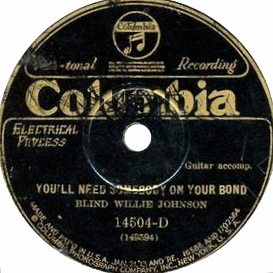
"You'll Need Somebody on Your Bond" is a gospel song that is attributed to both tradition and to gospel blues musician Blind Willie Johnson. Johnson first recorded the song in December 1930, although Delta blues musician Charley Patton recorded a similar "You're Gonna Need Somebody When You Die" in October 1929. Over the years, several other musicians have recorded renditions of the song.

"In My Time of Dying" is a gospel music song by Blind Willie Johnson. The title line, closing each stanza of the song, refers to a deathbed and was inspired by a passage in the Bible from Psalms 41:3 "The Lord will strengthen him upon the bed of languishing, thou wilt make all his bed in his sickness". Numerous artists have recorded variations, including Bob Dylan and Led Zeppelin.
Samuel Barclay Charters IV was an American music historian, writer, record producer, musician, and poet. He was a widely published author on the subjects of blues and jazz. He also wrote fiction.

"John the Revelator" is a gospel blues call and response song. Music critic Thomas Ward describes it as "one of the most powerful songs in all of pre-war acoustic music ... [which] has been hugely influential to blues performers". American gospel-blues musician Blind Willie Johnson recorded "John the Revelator" in 1930. Subsequently, a variety of artists, including the Golden Gate Quartet, Son House, Depeche Mode, Jerry Garcia Band, The White Stripes, The Forest Rangers, The Sword, have recorded their renditions of the song, often with variations in the verses and music.

"(The) Soul of a Man" is a gospel blues song recorded by Blind Willie Johnson in 1930. As with most of Johnson's songs, it deals with a spiritual theme within a blues musical framework. Accompanying Johnson is Willis B. Harris, sometimes identified as his first wife, who sang harmony on the refrain:

"It's Nobody's Fault but Mine" or "Nobody's Fault but Mine" is a song first recorded by gospel blues artist Blind Willie Johnson in 1927. It is a solo performance with Johnson singing and playing slide guitar. The song has been interpreted and recorded by numerous musicians in a variety of styles, including Led Zeppelin on their 1976 album Presence.

"Dark Was the Night, Cold Was the Ground" is a gospel blues song written and performed by American musician Blind Willie Johnson and recorded in 1927. The song is primarily an instrumental featuring Johnson's self-taught bottleneck slide guitar and picking style accompanied by his vocalizations of humming and moaning. It has the distinction of being one of 27 samples of music included on the Voyager Golden Record, launched into space in 1977 to represent the diversity of life on Earth. The song has been highly praised and covered by numerous musicians and is featured on the soundtracks of several films.
"Mother's Children Have a Hard Time", also known as "Motherless Children", is a gospel blues song recorded by Blind Willie Johnson in 1927. It is a solo performance, with Johnson singing and playing an acoustic slide guitar.
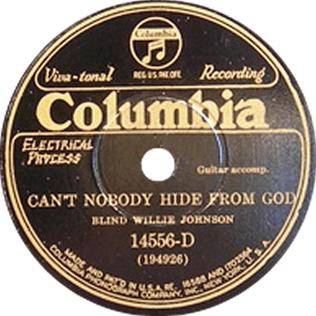
"Can't Nobody Hide from God" is a traditional gospel blues song recorded in 1930 by Blind Willie Johnson with by Willis B. Harris, who is thought to have been his first wife. It was released as a single on Columbia Records, backed with "If It Had Not Been For Jesus"
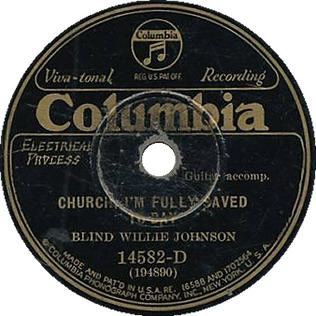
"Church, I'm Fully Saved To-Day" is a gospel blues song recorded by Blind Willie Johnson in 1930, with backing vocals by Willis B. Harris, sometimes identified as his first wife. It was released on Columbia 14582-D, as B-side to "The Soul of a Man". The song is derived from the hymn "Fully Saved Today" by William J. Henry (words) and Clarence E. Hunter (music), published in 1911, and follows a call-and-response format.

"(I'm Gonna Run to) The City of Refuge" is a gospel blues song recorded in 1928 by Blind Willie Johnson, with backing vocals by Willis B. Harris, who may have been his first wife. It is an adaptation of the traditional song "You Better Run".
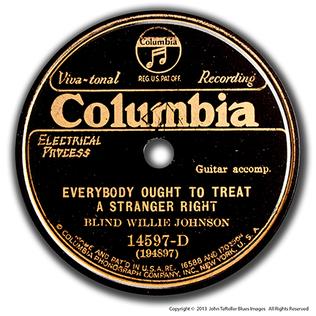
"Everybody Ought to Treat a Stranger Right" is a gospel blues song recorded in 1930 by Blind Willie Johnson with backing vocals by Willis B. Harris, who may have been his first wife. The song was released in 1930 on Columbia 14597 as B-side to "Go with Me to That Land".
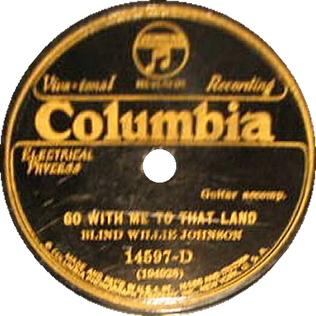
"Go with Me to That Land" or "Come and Go with Me (to That Land)" is a traditional gospel blues song recorded on April 20, 1930 by Blind Willie Johnson with backing vocals by Willis B. Harris, who may have been his first wife. It was released as a single on Columbia 14597-D, backed with "Everybody Ought to Treat a Stranger Right".

"God Moves on the Water" is a gospel blues song recorded by Blind Willie Johnson in 1929 and released on a 78 rpm record by Columbia Records.
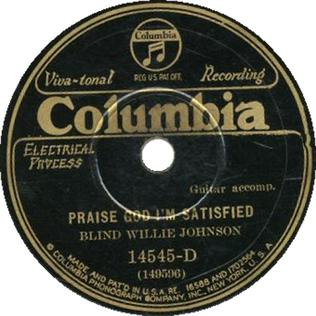
"Praise God I'm Satisfied" is a traditional gospel blues song recorded in 1929 by Blind Willie Johnson and Willis B. Harris (vocals), who is thought to have been his first wife.

The Complete Blind Willie Johnson is a compilation album of all the known recordings by American gospel blues singer-guitarist Blind Willie Johnson. As part of the Roots N' Blues series, it was released jointly by Columbia Records and Legacy Recordings, on April 27, 1993. All of the tracks on the two-compact disc set were originally issued by Columbia on the then-standard two-sided 78 rpm record format.

American Epic: The Best of Blind Willie Johnson is a compilation album released to accompany the award-winning American Epic documentary film series. It collects performances from Blind Willie Johnson's five recording sessions for Columbia Records in Dallas, Atlanta, and New Orleans between 1927 and 1930. The album was released as a 16-track download and a vinyl LP.
















